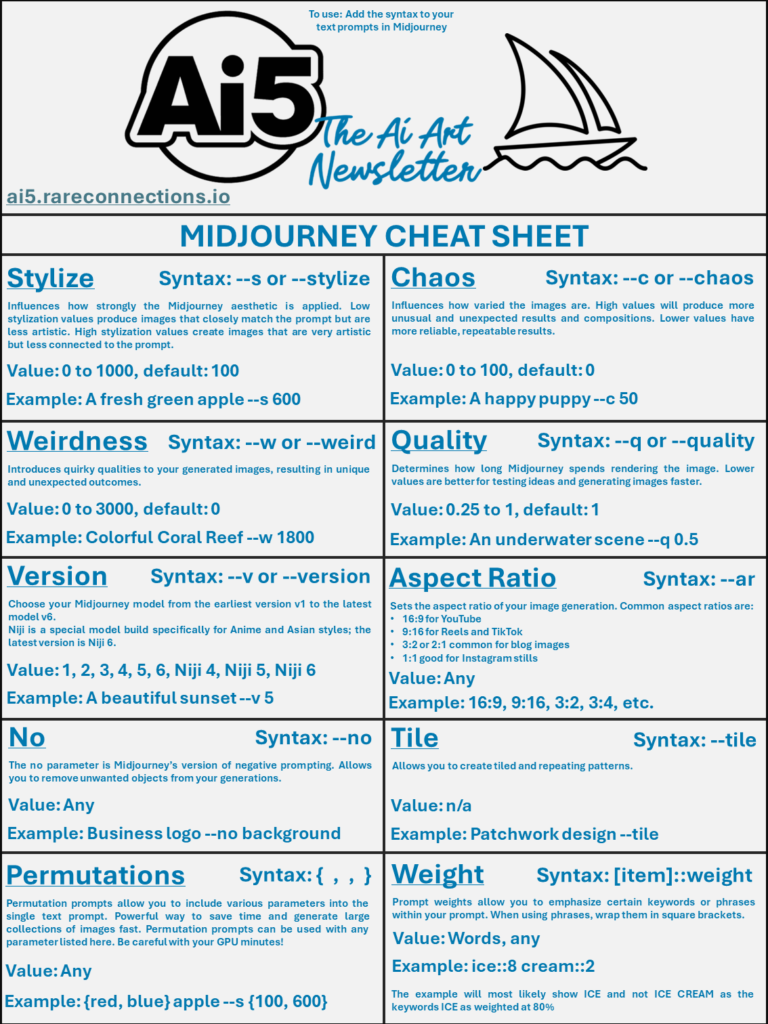The Midjourney Cheat Sheet From Beginner to Advanced
If you’ve ever spent time looking at any type of Midjourney prompt guide, you’ll know there’s a lot to remember!
Everything from negative prompting, to the stylize syntax, and permutation prompts. It can be a bit much when you’re starting out.
That’s why I’ve put together this Midjourney cheat sheet suitable for both beginners and advanced users so you can create the best prompts.

Click here to download the pdf!
Now, I’ll go through each of the 10 sections on the cheat sheet to give you some additional insight and prompt tips! ---
1. Stylize
Stylize is one of the fundamental Midjourney commands you should commit to memory.
It influences how strongly the Midjourney aesthetic is applied. Low stylization values produce images that closely match the prompt but are less artistic. High stylization values create images that are very artistic but less connected to the prompt.
Stylize Syntax
--s or --stylize
Values:
0 to 1000, default: --s 100
Example Prompt:
A fresh Green apple --s 600
2. Chaos
Chaos is a powerful way to generate unexpected outcomes from your Midjourney prompt.
It influences how varied the images are. High values will produce more unusual and unexpected results and compositions. Lower values have more reliable, repeatable results.
Chaos Syntax
--c or --chaos
Values:
0 to 100, default: --c 0
Example Prompt:
A happy puppy --c 50
3. Weirdness
Weirdness introduces quirky qualities to your generated images, similar to chaos, it causes the resulting images to have unexpected and weird traits.
Weirdness Syntax
--w or --weird
Values:
0 to 3000, default: --w 0
Example Prompt:
A colorful coral reef --w 1500
4. Quality
Quality determines how long Midjourney spends rendering the image. Lower values are better for testing ideas and generating concepts faster.
Quality Syntax
--q or --quality
Values:
0.25 to 1, default: --q 1
Example Prompt:
An underwater scene --q 0.5
5. Version
Midjourney allows you to choose which version you want to use, from the earliest version 1 to the current version.
Niji is a special Midjourney model that built specifically for Anime and Asian styles.
Version Syntax
--v or --version
Values:
1 to 6, default: current version 6 | Niji 4, Niji 5, Niji 6, default: Current version Niji 6
Example Prompt:
A beautiful sunset --v 5
6. Aspect Ratio
Sets the aspect ratio of your images. Common aspect ratios are:
• 16:9 for YouTube
• 9:16 for Reels and TikTok
• 3:2 or 2:1 common for blog images
• 1:1 good for Instagram stills
Aspect Ratio Syntax
--ar or --aspectratio
Values:
Any
Example Prompt:
A YouTube cover image --ar 16:9
7. No (negative prompts)
Midjourney’s no parameter is equivalent to a negative prompt used in other models. It allows you to prevent certain items and styles from appearing in your images.
No Syntax
--no
Values:
Any natural language word or words, separated by commas
Example Prompt:
A hand sketch of a beautiful woman --no pencil
8. Tile
The tile parameter allows you to create tiled and repeating patterns.
Tile Syntax
--tile
Values:
n/a
Example Prompt:
Patchwork design --tile
9. Permutation Prompts
Permutation prompts allow you to include various parameters into the single text prompt. Powerful way to save time and generate large collections of images fast. Permutation prompts can be used with any parameter listed here. Be careful with your GPU minutes!
Permutation Prompt Syntax
{item 1, item 2, item 3, etc}
Values:
Any natural language word or parameter
Example Prompt:
{red, blue} apple --s {100, 600}
10. Weight
Prompt weights allow you to emphasize certain keywords or phrases within your advanced prompts.
When using phrases, wrap them in square brackets.
Weight Syntax
[word]::[weight value]
Values:
Natural language text, any
Example Prompt:
ice::8 cream::2
Final Thoughts
I hope my Midjourney cheat sheet helps you create better art!
Don’t forget to download the high-definition .pdf file so you can always have it handy when using Midjourney. 🙂
Happy generating. 😎
